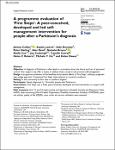A programme evaluation of ‘First Steps’: A peer-conceived, developed and led self-management intervention for people after a Parkinson's diagnosis
| dc.contributor.author | Collett, J | |
| dc.contributor.author | Lawrie, S | |
| dc.contributor.author | Bromley, S | |
| dc.contributor.author | Harling, P | |
| dc.contributor.author | Reed, A | |
| dc.contributor.author | Brusco, N | |
| dc.contributor.author | Coe, S | |
| dc.contributor.author | Coebergh, J | |
| dc.contributor.author | Carroll, C | |
| dc.contributor.author | Roberts, HC | |
| dc.contributor.author | Hu, MT | |
| dc.contributor.author | Dawes, H | |
| dc.date.accessioned | 2023-11-24T09:42:13Z | |
| dc.date.available | 2023-11-24T09:42:13Z | |
| dc.date.issued | 2023-11-09 | |
| dc.identifier.issn | 0269-2155 | |
| dc.identifier.issn | 1477-0873 | |
| dc.identifier.uri | https://pearl.plymouth.ac.uk/handle/10026.1/21695 | |
| dc.description.abstract |
ObjectiveA diagnosis of Parkinson's often leads to uncertainty about the future and loss of perceived control. Peer support may offer a means to address these concerns and promote self-management. DesignA programme evaluation of the feasibility and potential effects of ‘First Steps’, utilising a pragmatic step wedge approach. Comparing First Steps (intervention) to (control) conditions. Setting: In the community at four sites in southern England. Participants: Newly diagnosed (≤ 12months) people with Parkinson's. Intervention: First Steps was a 2-day peer-conceived, developed and led intervention to support self-management. Main measures: At 0, 12 and 24 weeks anxiety and depression (Hospital, Anxiety and Depression Scale, HADS), daily functioning (World Health Organisation Disability Assessment Schedule, WHODAS), physical activity, quality of life (EQ5D), carer strain and service utilisation were assessed. ResultsBetween February 2018 and July 2019, 36 participants were enrolled into intervention and 21 to control conditions, all were included in statistical analysis. Lost to follow up was n = 1 (intervention) and n = 1 adverse event was reported (control, unrelated). Of the 36 allocated to the intervention n = 22 participants completed both days of First Steps during the study period. Completion of outcome measures was >95% at 24 weeks. Small effects favouring the intervention were found for HADS (odds ratio (OR) = 2.06, 95% confidence interval (CI) 0.24:17.84), Carer Strain Index (OR = 2.22, 95% CI 0.5:9.76) and vigorous (d = 0.42, 95% CI −0.12:0.97) and total physical activity (d = 0.41, 95% CI −0.13:0.95). EQ5D, WHOSDAS and service utilisation, was similar between groups. ConclusionsFirst Steps was feasible and safe and we found potential to benefit physical activity, mental health and carer strain. Further research with longer-term follow up is warranted. | |
| dc.format.extent | 403-413 | |
| dc.format.medium | Print-Electronic | |
| dc.language | en | |
| dc.publisher | SAGE Publications | |
| dc.subject | Carers | |
| dc.subject | Parkinson’s disease | |
| dc.subject | peer support | |
| dc.subject | physical activity | |
| dc.subject | self-management | |
| dc.subject | Humans | |
| dc.subject | Self-Management | |
| dc.subject | Quality of Life | |
| dc.subject | Program Evaluation | |
| dc.subject | Parkinson Disease | |
| dc.subject | Physical Therapy Modalities | |
| dc.title | A programme evaluation of ‘First Steps’: A peer-conceived, developed and led self-management intervention for people after a Parkinson's diagnosis | |
| dc.type | journal-article | |
| dc.type | Journal Article | |
| plymouth.author-url | https://www.ncbi.nlm.nih.gov/pubmed/37941369 | |
| plymouth.issue | 3 | |
| plymouth.volume | 38 | |
| plymouth.publication-status | Published online | |
| plymouth.journal | Clinical Rehabilitation | |
| dc.identifier.doi | 10.1177/02692155231210969 | |
| plymouth.organisational-group | |Plymouth | |
| plymouth.organisational-group | |Plymouth|Research Groups | |
| plymouth.organisational-group | |Plymouth|Faculty of Health | |
| plymouth.organisational-group | |Plymouth|Research Groups|Institute of Translational and Stratified Medicine (ITSMED) | |
| plymouth.organisational-group | |Plymouth|Research Groups|Institute of Translational and Stratified Medicine (ITSMED)|CCT&PS | |
| plymouth.organisational-group | |Plymouth|REF 2021 Researchers by UoA | |
| plymouth.organisational-group | |Plymouth|Users by role | |
| plymouth.organisational-group | |Plymouth|Users by role|Academics | |
| plymouth.organisational-group | |Plymouth|REF 2021 Researchers by UoA|UoA03 Allied Health Professions, Dentistry, Nursing and Pharmacy | |
| plymouth.organisational-group | |Plymouth|Faculty of Health|Peninsula Medical School | |
| plymouth.organisational-group | |Plymouth|Research Groups|FoH - Community and Primary Care | |
| plymouth.organisational-group | |Plymouth|Research Groups|FoH - Applied Parkinson's Research | |
| plymouth.organisational-group | |Plymouth|Research Groups|Plymouth Institute of Health and Care Research (PIHR) | |
| plymouth.organisational-group | |Plymouth|REF 2028 Researchers by UoA | |
| plymouth.organisational-group | |Plymouth|REF 2028 Researchers by UoA|UoA03 Allied Health Professions, Dentistry, Nursing and Pharmacy | |
| dc.publisher.place | England | |
| dcterms.dateAccepted | 2023-10-13 | |
| dc.date.updated | 2023-11-24T09:42:01Z | |
| dc.rights.embargodate | 2023-11-25 | |
| dc.identifier.eissn | 1477-0873 | |
| rioxxterms.versionofrecord | 10.1177/02692155231210969 |


